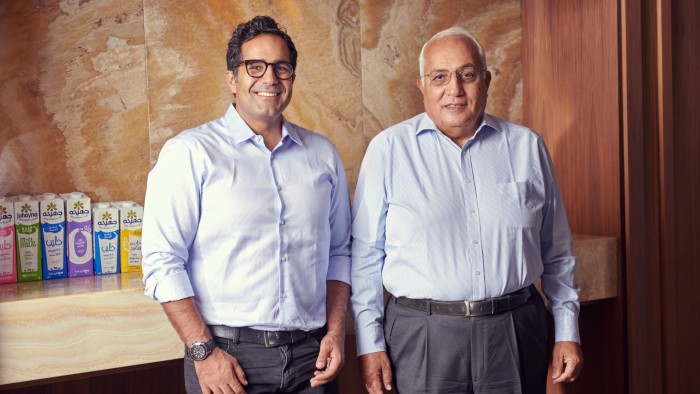Egypt releases prominent businessmen detained on terrorism charges

Simply sign up to the Middle Eastern politics & society myFT Digest -- delivered directly to your inbox.
Egyptian authorities have released the founder of the Arab state’s largest dairy and juice producer more than two years after arresting him over accusations of financing and being a member of a terrorist organisation.
Safwan Thabet, who established Cairo-listed Juhayna Food Industries in the early 1980s, was detained in December 2020. His son Seif el-Din Thabet, who had taken over as chief executive, was arrested months later.
Both were released on Saturday, according to their family.
“God has accepted our prayers, my father Safwan Thabet and my brother Seif El-Din Thabet are with us,” Mariam Thabet wrote on social media.
The Thabets’ arrests had rocked one of Egypt’s most successful companies and sent shockwaves through the business community operating in one of the region’s most autocratic states.
Since President Abdel Fattah al-Sisi seized power in a 2013 coup that ousted the country’s democratically elected Islamist president, his military-led regime has used the accusation of terrorism to target activists, academics, journalists and business people.
Friends of the Thabet family had always insisted that the father and son were innocent and suggested they were arrested to pressure them to hand over the business to the state.
Two people close to the family previously told the Financial Times that 48 hours before Seif was detained, security agents had warned him that he faced his father’s fate unless he “signed over the whole company”. Seif told the authorities that he was not at liberty to sign on behalf of the family, which owned 51 per cent of Juhayna, the people said.
The government neither commented on their original arrest or their release. Neither men faced trial.
Safwan Thabet’s grandfather was a senior member of the Muslim Brotherhood, which briefly took power after the 2011 popular uprising that toppled veteran president Hosni Mubarak.
But friends of the family insisted that the septuagenarian businessman and his son, both of whom sat on the boards of business associations, including the Federation of Egyptian Industries and the Chamber of Food Industries, had no ties to the Islamist movement or any involvement in political activity.
Thousands of members and supporters of the brotherhood were arrested after Sisi took office and designated the movement a terrorist organisation. The crackdown against the Islamists morphed into a broad campaign against all forms of criticism or dissent.
The government released about 800 political prisoners last year and pledged to establish a political dialogue with civil society and opposition parties.
Those moves came as Egypt prepared to host the COP27 climate conference in November, which put a rare spotlight on human rights abuses in the nation, and as Cairo grappled with an economic crisis that forced it to turn to the IMF and Gulf states for bailouts. But activists say arrests continue.
As part of a $3bn IMF loan package agreed in October, Sisi’s regime has agreed to reduce the footprint of the state in the economy, including military-owned companies, by withdrawing from “non-strategic” sectors and asset sales.
Under Sisi, a former army chief, the military expanded its reach across the economy, cowing the private sector as companies worried about having to contend with the state’s most powerful institution.
Safwan Thabet’s troubles began in 2015, when his personal assets were frozen because of his alleged links to the brotherhood. Seif took over as chief executive in 2016 and was appointed deputy chair.
After their arrest, the group appointed a new chief executive and chair. Two Thabets remain on the board.
Al-Ahram, a state-owned newspaper, said on Saturday that the Thabet case included another prominent businessman, Sayed Ragab al-Sewerky, who owns El-Tawheed & El-Nour department stores.
Sewerky was also arrested in December 2020 for allegedly financing a terrorist group and remains in prison, Al-Ahram said.
Comments